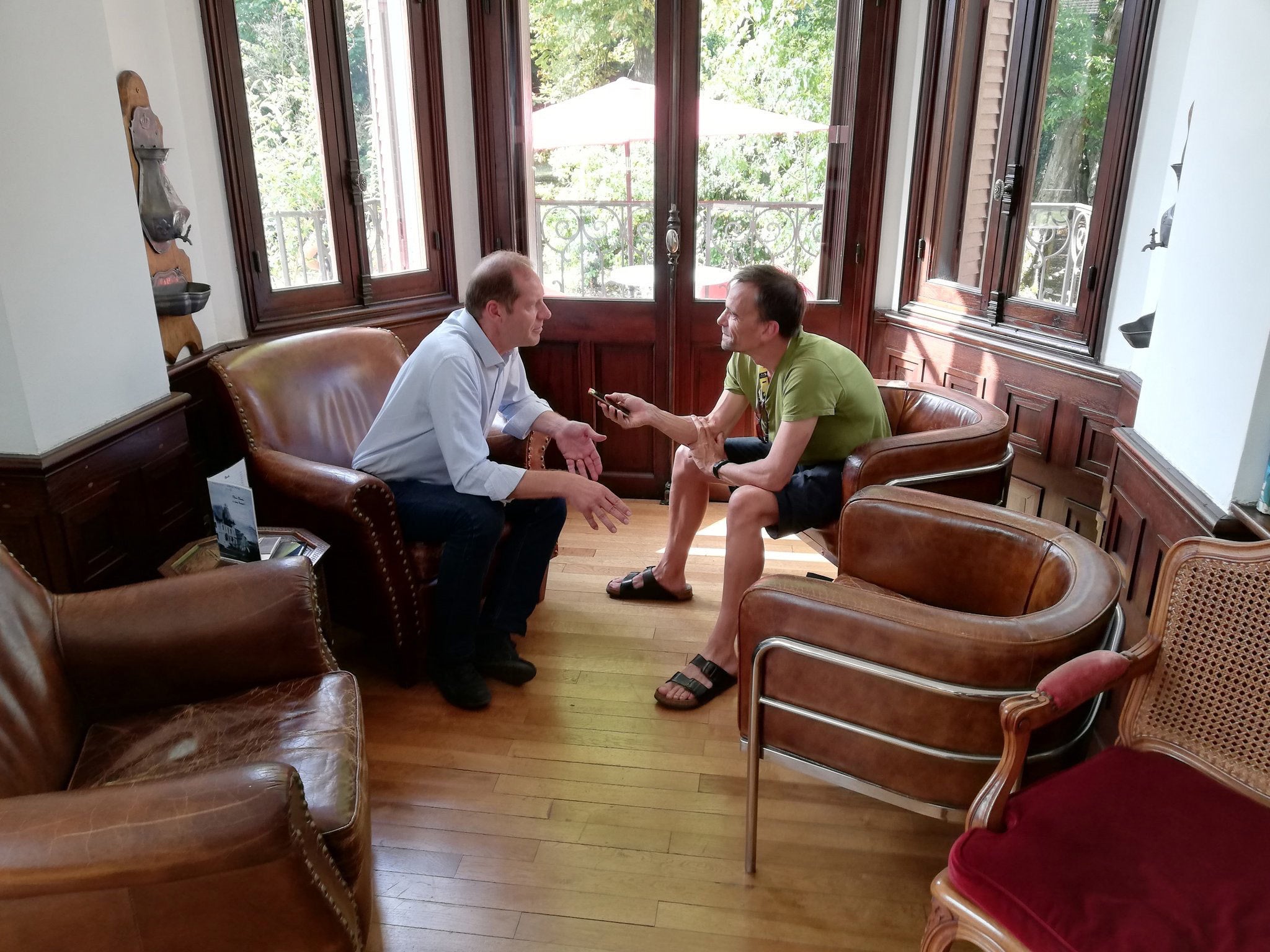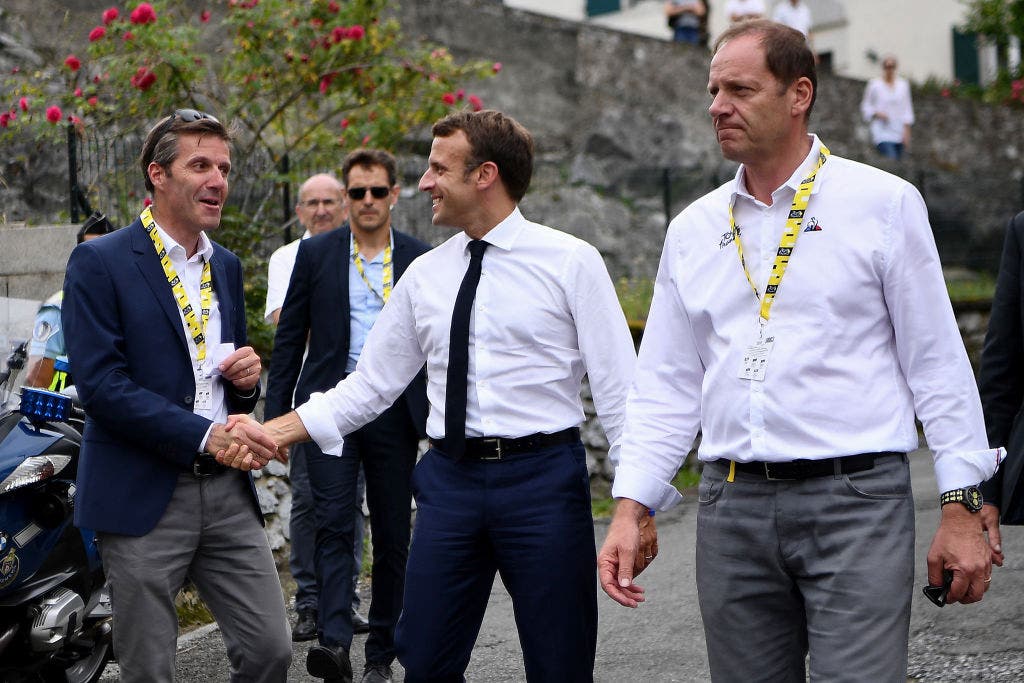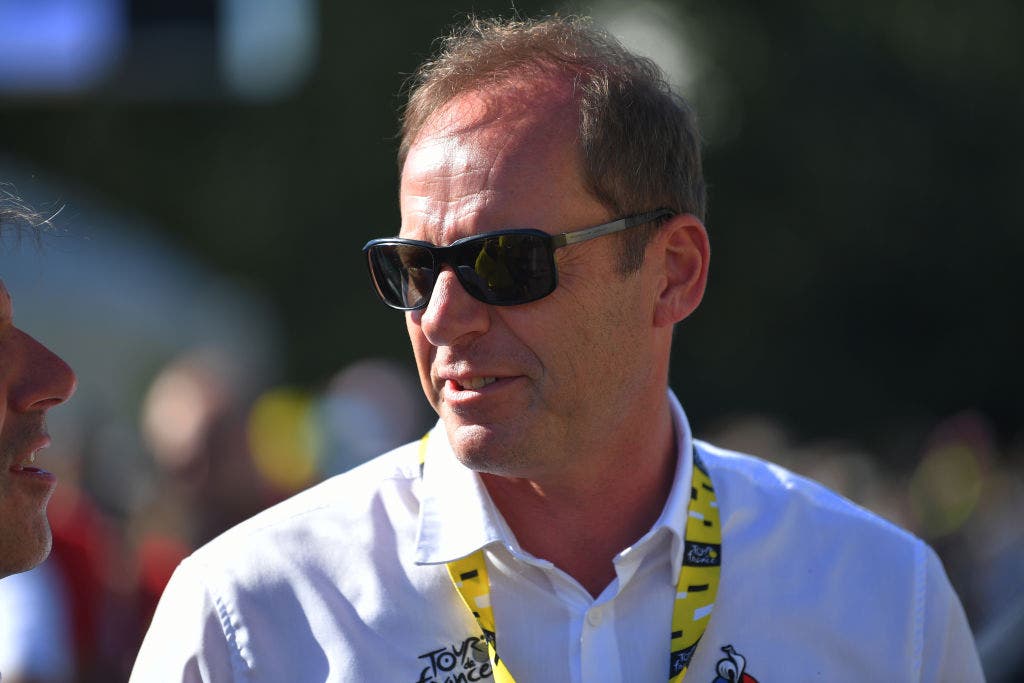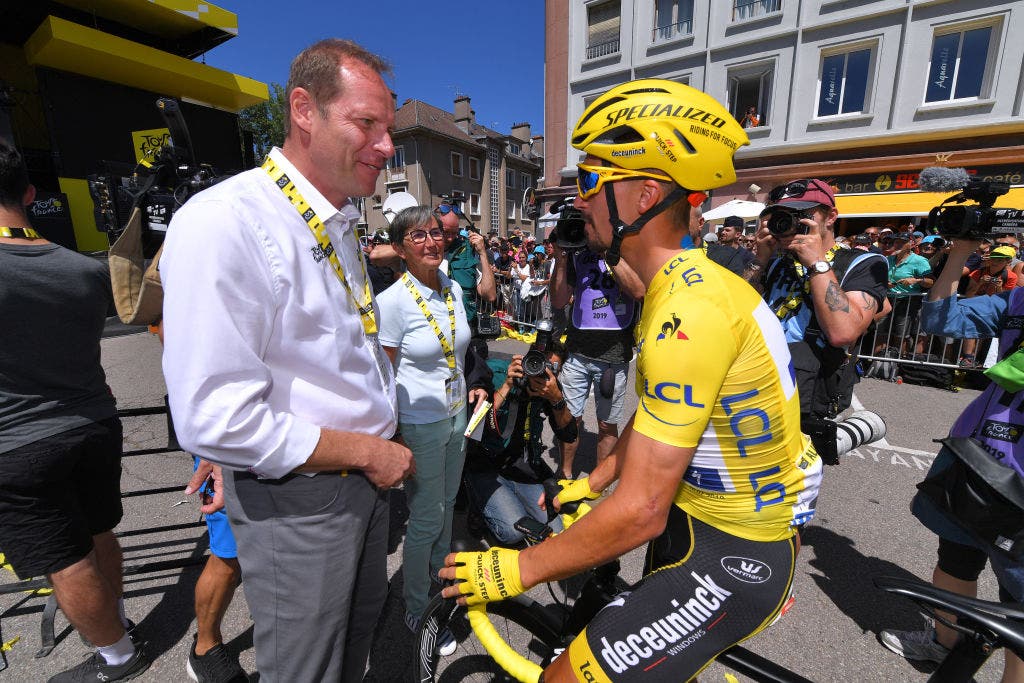Christian Prudhomme finally has his storybook Tour de France

I’m in the lobby of a hotel in Tarascon-sur-Ariege, just down the road from where stage 15 concluded. In walks Christian Prudhomme, the director of the Tour de France, who happens to be staying in the same place on the morning of the second rest day.
Prudhomme takes a beeline for the pastries and, on his way, sees me and immediately deviates from the food. This is the Christian Prudhomme I’ve come to know. He’s articulate – in several languages – and friendly beyond expectations.
Prudhomme agrees to sit for an interview. After 15 stages of the 2019 Tour de France, there’s still no hint of exactly who the winner will be, and nobody is more excited about the Tour’s unpredictability than Prudhomme.
“We have attacks every day. We have surprises every day. We have great winners. We have a great race,” he says.
This is the quick summary offered by the director of the Tour de France since 2006, Christian Prudhomme, when we start talking about how the 2019 race has been a compelling one.
On Saturday afternoon, he was joined in Skoda number-one by the President of the Republic, Emanuel Macron for the final 75km of Stage 14. He rubs shoulders with dignitaries on a regular basis, speaks politics and cycling with equal ease, and yet somehow find the time to greet an Aussie journalist who has covered the Tour since before he was even the TV anchor who called the action for France Télévisions.

We go back a while and it’s with great pleasure that I refer to him as ‘un ami’. That might be pushing it. Nonetheless, that’s how he makes a guy feel.
He’s a friend of many and seems to have time for everyone, no matter how tight his schedule, or how hoarse he’s become.
His voice began to fade at the end of the impromptu interview he duly gave me after our handshake at breakfast. But only once he’d offered an appraisal of what has been an exciting race, one in which – with six stages left to go – seems to be working out in favor of French riders.
Alaphilippe still leads, we know that. And the challengers on Prudhomme’s list include: Geraint Thomas (Ineos, in 2nd at 1:35), Stevie Kruijswijk (Jumbo-Visma, 3rd at 1:47), Thibaut Pinot (Groupama-FDJ, 4th at 1:50) and Egan Bernal (Ineos, 5th at 2:02).
He didn’t name the sixth. But these are the five we spoke a little more about on Monday morning.
“Of course I’m happy,” says Prudhomme, “I hope the third week will be as good as the first two.”
Don’t we all? What a race it has been. And, for the first time in years, at this point of the race there’s no obvious sign of who is going to stand on top of the podium in Paris on Sunday.
Anticipation is key, that’s a common theme from Prudhomme since he took over the role of Tour director from Jean-Marie Leblance. The two Frenchmen shared the position in 2006, allowing the man who had been the race director since that Tour – the one in 1989, the one with a time trial finish on the Champs-Elysées, the one in which aerobars made their debut, the race that a Frenchman was destined to win… the one that an American stole from under the nose of Laurent Fignon by setting a record average speed in a TT at the Tour.
Oh man, wouldn’t all race directors dream of having been responsible for That Route? What a showcase it was: excitement to the end. But then heartbreak for the locals and celebrations for Greg LeMond.
Since that eight-second victory, there have been other close races; interesting contests, some drama, loads of tension and plenty of scandals. But even the victory by Alberto Contador and the 23-second winning margin over Cadel Evans in 2007, was—ah, well let’s be honest—it was flat in comparison to 1989.
That was Prudhomme’s first solo effort. It was a race that generated plenty of interest but wouldn’t we all rather forget about Vino’s blood and Rasmussen’s lies? It was what it was and it served a purpose but what a Tour director wants is certainly not an eviction of the yellow jersey by his own team after the final mountain stage.

Planning for anticipation
At the beginning of our discussion earlier today, I started the questions by offering him “compliments on a wonderful course”. He nods, acknowledges the sentiment but then takes zero credit.
“Yes,” he replies, “but the compliments are for the riders.”
There’s no escaping the old adage: it’s the riders who make the race.
Still, it’s worth noting that Prudhomme dares to innovate. He has been bold enough to insist on summit finishes where Leblanc never dreamed to park the massive ‘zone technique’ required to allow the broadcast(s) to happen.
It’s too difficult, said Leblanc.
In contrast, Prudhomme seeks solutions. Let’s try it, he insists. And it happens.
Consider some examples: the stage finish on the Col d’Aubisque (2007, made infamous by Rasmussen’s expulsion), Mont Ventoux on the penultimate day (in 2009), the Col du Tourmalet (2010 and again this year), the double ascent of Alpe d’Huez in 2015, etc.
He offers a nod to tradition but seeks new locations. And La Planche des Belles Filles is a fine example. It was impossible, they said. But he insisted. Since 2012, that remote climb has become a feature of four Tours. It is another Prudhomme initiative. It wasn’t easy, but he made it happen.
Growing the women’s race
This year’s edition of La Course by Le Tour de France produced a thrilling finale, which saw Marianne Vos spring from the peloton on the final steep climb to catch and pass Aussie Amanda Spratt within sight of the finish line. After the race rumors swirled that ASO is working on plans for a new project around women’s cycling.
Prudhomme confirms that, yes, ASO is working on more projects for women’s cycling. However, whatever new races or new events may be in the works will not be scheduled alongside the Tour de France.
“Women’s cycling is very important for us and we can’t do another race – one more race – during the Tour in July,” he says. “We don’t know how to.”
Prudhomme says he recalls a conversation he had with Vos about La Course and what ASO can bring to the women’s peloton. Prudhomme says the women’s racers want media attention. And overlapping a women’s race with a men’s race may not be the best model.
“So, I know what you do for cycling but when you organize women’s racing—for example, Liège-Bastogne-Liège, and there is nothing in the newspapers… pffff!” he says.
There will be TV coverage for the women’s edition of Liège-Bastogne-Liège next year, he says, and ASO has struck an agreement with Belgian TV company RTBF. Building upon its women’s races is “step-by-step” he says, but he reiterates that adding another event on top of the Tour de France is not part of the solution.
“Already there are 29,000 policemen – gendarme and firemen. We can’t have [it any other way] with what happened in France in the last few years – the attacks, the riots, social difficulties – it’s impossible to have [even] one policeman [more than we already have],” he says.
“But, yes: we have to do more for women but it won’t be in July.”

Picking the winner: Who has the best ‘number-two’ option?
“On the finish line and La Planche des Belles Filles,” he says in response to my suggestion that the dirt road finale in stage six was a ‘masterstroke.
“You had three riders within two seconds: Geraint Thomas – wow! Thibaut Pinot – ooh! And Julian Alaphilippe with his yellow jersey.”
He may have to be politically correct much of the time but that diplomacy hasn’t come at the expense of his passion for cycling. He still loves a good race.
He loves it even more if it’s one of his, done on a course he insisted should be carved out of a ski field.
“Planche des Belles Filles is only possible because the politicians from the region(s) love cycling and love the Tour,” he says.
“Without ‘Mr K’ – Yves Krattinger (Président du Conseil général et Sénateur of the Haute-Saône) – it would have been impossible. He is the guy who, seven years ago, said to us: ‘Yes, it’s possible. I agree. We will do some works to have a finish line…’ And he did it.
“It was not that easy for him.”
But they did it. Cool, huh?
Picking the winner: who has the best “number-two”?
We talked through a range of topics, including the changing culture of the race, route design and, of course, the possibility of there being a French winner in 2019.
When I pushed further for his prediction of who the champion will be next weekend, he doesn’t opt for diplomacy, nor does he try to avoid the question.
He answers it by demonstrating how well he knows the sport.
To Christian Prudhomme, it boils down to team support.
“What is very important,” he says, “is to know the number-two – not the number-two of the Tour, the number-two of the teams.”
And then he offers two fine examples.
“David Gaudu is so important for Thibaut Pinot.
“But… is Geraint Thomas number-two [for Ineos]? Or is Egan Bernal number-two?
“[Either way], it’s not the same scenario because [Ineos] will have, for sure, the best number-two in the team. So, it will depend on that.
“Is Gaudu able to do what he did in the last days (stages 14 and 15) and who is number-one in Ineos? Because, if today they say, ‘It’s Geraint Thomas the defending champion…’ or ‘Egan Bernal…’ with the other guy as a team-mate – and ‘only’ a team-mate, not a co-leader – it will be very different because suddenly they will [again] have, according to me, the power.”
And so, avoiding patriotism, it seems that he’s suggesting a Welshman or a Colombian will come out on top in the coming days. Hmmm. Stay tuned.
You can read the full transcript of the interview and hear an audio version on the RIDE Media website.